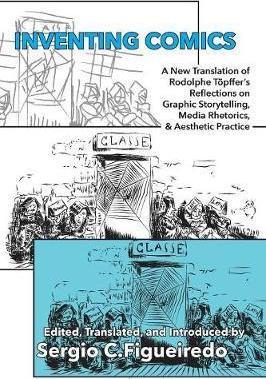Inventing Comics: A New Translation of Rodolphe Töpffer's Reflections on Graphic Storytelling, Media Rhetorics, and Aesthetic Practice

Inventing Comics: A New Translation of Rodolphe Töpffer's Reflections on Graphic Storytelling, Media Rhetorics, and Aesthetic Practice
In recent years, graphic novels have gained a renewed interest from a host of scholars in a diverse range of fields, including rhetoric and writing, media studies, literary studies, visual communication, graphic arts, and art history. While many of these studies reference Rodolphe Töpffer as the inventor (or, "father") of the genre, his scholarly work addressing the theoretical foundation and significance of graphic novels has remained unavailable to English-speaking audiences. Inventing Comics fills this gap by presenting a translation of two essays by Töpffer that place the invention of graphic novels at the intersection of rhetoric, philosophy, aesthetics, and civic life.
In his role as a professor of rhetoric and belle-lettres at the Academy of Geneva, Töpffer not only wrote popular fiction (graphic novels, novels, plays) but also a host of scholarly works addressing the relationship between aesthetics and poetics. Pulling from Töpffer's scholarly corpus, Figueiredo argues that Töpffer's invention of graphic novels was the manifestation of a much broader media theory, one that engaged with the social, cultural, political, and technological shifts accompanying the Industrial Revolution in the early- and mid-nineteenth century. While Figueiredo's primary focus is to situate Töpffer in the histories of rhetoric, media studies, and the emergence of what Gregory L. Ulmer has called the apparatus of electracy, these essays also resonate with affect theory, apparatus theory, art history, graphic novels, literary studies, philosophy, sensory studies, and writing studies.
About the Editor and Translator
Sergio C. Figueiredo is Assistant Professor of Media and Rhetoric in the Department of English at Kennesaw State University. He received his PhD in Rhetorics, Communication, and Information Design from Clemson University, and his MA in English from Marshall University. His research focuses on the intersections of rhetorical theory, media studies, and electracy. His work has appeared in Textshop Experiments, ImageTexT: Interdisciplinary Comics Studies, Journal of Visual Literacy, and In Media Res: A Media Commons Project. He serves as a Fellow with the Global Art and Ideas Nexus, contributing to the organization's e-Magazine, Esthesis, and special programs, including the Critical Conversations series.
PRP: 272.39 Lei
Acesta este Pretul Recomandat de Producator. Pretul de vanzare al produsului este afisat mai jos.
245.15Lei
245.15Lei
272.39 LeiLivrare in 2-4 saptamani
Descrierea produsului
In recent years, graphic novels have gained a renewed interest from a host of scholars in a diverse range of fields, including rhetoric and writing, media studies, literary studies, visual communication, graphic arts, and art history. While many of these studies reference Rodolphe Töpffer as the inventor (or, "father") of the genre, his scholarly work addressing the theoretical foundation and significance of graphic novels has remained unavailable to English-speaking audiences. Inventing Comics fills this gap by presenting a translation of two essays by Töpffer that place the invention of graphic novels at the intersection of rhetoric, philosophy, aesthetics, and civic life.
In his role as a professor of rhetoric and belle-lettres at the Academy of Geneva, Töpffer not only wrote popular fiction (graphic novels, novels, plays) but also a host of scholarly works addressing the relationship between aesthetics and poetics. Pulling from Töpffer's scholarly corpus, Figueiredo argues that Töpffer's invention of graphic novels was the manifestation of a much broader media theory, one that engaged with the social, cultural, political, and technological shifts accompanying the Industrial Revolution in the early- and mid-nineteenth century. While Figueiredo's primary focus is to situate Töpffer in the histories of rhetoric, media studies, and the emergence of what Gregory L. Ulmer has called the apparatus of electracy, these essays also resonate with affect theory, apparatus theory, art history, graphic novels, literary studies, philosophy, sensory studies, and writing studies.
About the Editor and Translator
Sergio C. Figueiredo is Assistant Professor of Media and Rhetoric in the Department of English at Kennesaw State University. He received his PhD in Rhetorics, Communication, and Information Design from Clemson University, and his MA in English from Marshall University. His research focuses on the intersections of rhetorical theory, media studies, and electracy. His work has appeared in Textshop Experiments, ImageTexT: Interdisciplinary Comics Studies, Journal of Visual Literacy, and In Media Res: A Media Commons Project. He serves as a Fellow with the Global Art and Ideas Nexus, contributing to the organization's e-Magazine, Esthesis, and special programs, including the Critical Conversations series.
Detaliile produsului








